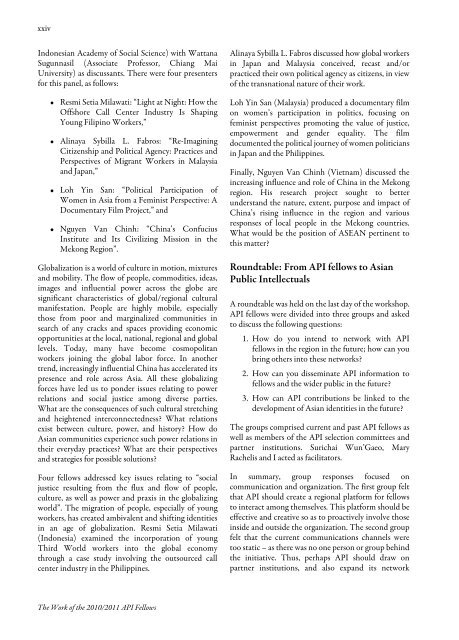Untitled - Api-fellowships.org
Untitled - Api-fellowships.org
Untitled - Api-fellowships.org
You also want an ePaper? Increase the reach of your titles
YUMPU automatically turns print PDFs into web optimized ePapers that Google loves.
xxivIndonesian Academy of Social Science) with WattanaSugunnasil (Associate Professor, Chiang MaiUniversity) as discussants. There were four presentersfor this panel, as follows:• Resmi Setia Milawati: “Light at Night: How theOffshore Call Center Industry Is ShapingYoung Filipino Workers,”• Alinaya Sybilla L. Fabros: “Re-ImaginingCitizenship and Political Agency: Practices andPerspectives of Migrant Workers in Malaysiaand Japan,”• Loh Yin San: “Political Participation ofWomen in Asia from a Feminist Perspective: ADocumentary Film Project,” and• Nguyen Van Chinh: “China’s ConfuciusInstitute and Its Civilizing Mission in theMekong Region”.Globalization is a world of culture in motion, mixturesand mobility. The flow of people, commodities, ideas,images and influential power across the globe aresignificant characteristics of global/regional culturalmanifestation. People are highly mobile, especiallythose from poor and marginalized communities insearch of any cracks and spaces providing economicopportunities at the local, national, regional and globallevels. Today, many have become cosmopolitanworkers joining the global labor force. In anothertrend, increasingly influential China has accelerated itspresence and role across Asia. All these globalizingforces have led us to ponder issues relating to powerrelations and social justice among diverse parties.What are the consequences of such cultural stretchingand heightened interconnectedness? What relationsexist between culture, power, and history? How doAsian communities experience such power relations intheir everyday practices? What are their perspectivesand strategies for possible solutions?Four fellows addressed key issues relating to “socialjustice resulting from the flux and flow of people,culture, as well as power and praxis in the globalizingworld”. The migration of people, especially of youngworkers, has created ambivalent and shifting identitiesin an age of globalization. Resmi Setia Milawati(Indonesia) examined the incorporation of youngThird World workers into the global economythrough a case study involving the outsourced callcenter industry in the Philippines.Alinaya Sybilla L. Fabros discussed how global workersin Japan and Malaysia conceived, recast and/orpracticed their own political agency as citizens, in viewof the transnational nature of their work.Loh Yin San (Malaysia) produced a documentary filmon women’s participation in politics, focusing onfeminist perspectives promoting the value of justice,empowerment and gender equality. The filmdocumented the political journey of women politiciansin Japan and the Philippines.Finally, Nguyen Van Chinh (Vietnam) discussed theincreasing influence and role of China in the Mekongregion. His research project sought to betterunderstand the nature, extent, purpose and impact ofChina’s rising influence in the region and variousresponses of local people in the Mekong countries.What would be the position of ASEAN pertinent tothis matter?Roundtable: From API fellows to AsianPublic IntellectualsA roundtable was held on the last day of the workshop.API fellows were divided into three groups and askedto discuss the following questions:1. How do you intend to network with APIfellows in the region in the future; how can youbring others into these networks?2. How can you disseminate API information tofellows and the wider public in the future?3. How can API contributions be linked to thedevelopment of Asian identities in the future?The groups comprised current and past API fellows aswell as members of the API selection committees andpartner institutions. Surichai Wun’Gaeo, MaryRachelis and I acted as facilitators.In summary, group responses focused oncommunication and <strong>org</strong>anization. The first group feltthat API should create a regional platform for fellowsto interact among themselves. This platform should beeffective and creative so as to proactively involve thoseinside and outside the <strong>org</strong>anization. The second groupfelt that the current communications channels weretoo static – as there was no one person or group behindthe initiative. Thus, perhaps API should draw onpartner institutions, and also expand its networkThe Work of the 2010/2011 API Fellows
















